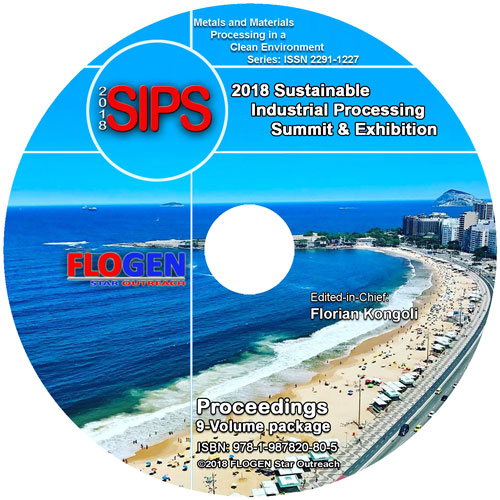2018-Sustainable Industrial Processing Summit
SIPS2018 Volume 9. Energy Production, Secondary Battery
| Editors: | F. Kongoli, H. Dodds, M. Mauntz, T. Turna, V. Kumar, K. Aifantis |
| Publisher: | Flogen Star OUTREACH |
| Publication Year: | 2018 |
| Pages: | 170 pages |
| ISBN: | 978-1-987820-98-0 |
| ISSN: | 2291-1227 (Metals and Materials Processing in a Clean Environment Series) |

CD shopping page
Hydrometallurgically Generated Nanostructured Lead(II) Oxide from discarded Lead-Acid Batteries: From Laboratory to Pre-Pilot Scale-up
Robert Liu1; Vimalnath Selvaraj2; Marcel Yiao2; Vasant Kumar3; Steve Andrew1; Spencer Lowe1; Miles Freeman1; Johdie Harris1; Athan Fox1;1AURELIUS ENVIRONMENTAL, Dudley, United Kingdom; 2UNIVERSITY OF CAMBRIDGE, Cambridge, United Kingdom; 3UNIVERSITY OF CAMBRIDGE, Cambridge, United Kingdom ;
Type of Paper: Regular
Id Paper: 429
Topic: 14
Abstract:
The recycling of lead-acid batteries (LABs) is currently an energy intensive, inefficient and polluting procedure. An alternative hydrometallurgical recycling route using citric acid(1)(2) has been proven to effectively and efficiently facilitate the extraction of lead from discarded LAB paste material to form an intermediate that can be further processed to be potentially reused again in new LABs.
This citric acid route has been extensively trialled in the laboratory at the University of Cambridge and has recently been through several concurrent iterative experimental trials at a pre-pilot scale at Aurelius Environmental Ltd in Tipton, UK.
The procedure of scaling up any process from the laboratory to pilot and, if successful, to full commercial scale is a journey that is well trodden. The current review paper will seek to describe some of the challenges and successes that has thus far been encountered in scaling up this promising recycling route.
As the author, associates and collaborators attempt to translate what has been shown in the laboratory to a pre-pilot scale, the ultimate aim is to transition to a full pilot scale and beyond in the near future. The progress and future aims of this nascent technology will be outlined and discussed in order to inform and educate a wider audience of this exciting and sustainable recycling method.
Keywords:
Recycling; Energy; Scale-up; Nanomaterials; Secondary Battery; Sustainability; Technology; Lead-acid Batteries, HydrometallurgyReferences:
[1] Sonmez MS, Kumar RV. Leaching of waste battery paste components. Part 1: Lead citrate synthesis from PbO and PbO2. Hydrometallurgy. 2009;95(1-2):53-60.[2] Sonmez MS, Kumar RV. Leaching of waste battery paste components. Part 2: Leaching and desulphurisation of PbSO4 by citric acid and sodium citrate solution. Hydrometallurgy. 2009;95(1-2):82-6.
[3] Yang J, Kumar RV, Singh DP. Combustion synthesis of PbO from lead carboxylate precursors relevant to developing a new method for recovering components from spent lead-acid batteries. Journal of Chemical Technology & Biotechnology. 2012;87(10):1480-8.